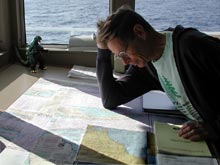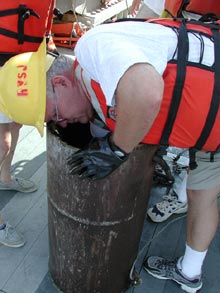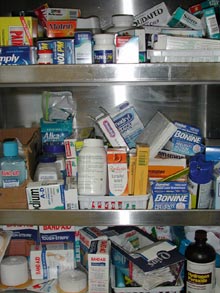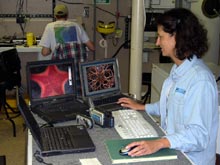
Frustrated with never-ending problems and delays, exploration chief scientist Charlie Barans contemplates what to do next. Click image for larger view.
Murphy’s Law: What can go wrong will!
August 4, 2003
Charlie Barans
Chief Scientist
Charleston Bump Expedition
South Carolina Department of Natural Resources
Not unlike many of life’s little adventures, a cruise of “exploration” can be filled with frustrations and disappointments. However, by taking a step back, focusing on the main objectives, being flexible, and maybe even incorporating a bit of humor, many of these problems can be overcome.
Despite many months of planning, organization and preparations, things seem to go wrong almost daily. Expeditions with multiple investigators and multiple objectives tend to be more complicated and result in, of course, multiple problems. Add in complex vessels, a variety of sampling tools, and different personalities, and Murphy’s Law hits high gear. Oh, and don't forget the unpredictable weather. As any fisherman or farmer knows, there is nothing anyone can do about the weather, except be patient and wait for it to improve.

Always have a contingency plan. Jerry McLelland, a professor at the University of Southern Mississippi, reaches into the pipe dredge to extract a sample. This was the first successful use of the pipe dredge, custom-built for the Charleston Bump expedition. Click image for larger view.
During the first three days of the cruise, the starboard engine developed fuel leaks. If not for the chief engineer's clever repairs, this would have seriously delayed the cruise. Then high winds and seas quickly set in, causing the cancellation of today’s two dives.
The loss of even a single sub dive can be a serious setback to any exploratory mission. But it is in precisely these circumstances that pre-cruise planning can be very valuable. When one sampling activity slows or is canceled, a second or third activity may be successfully undertaken and completed.
High seas often wreak more havoc on personnel than equipment. Most sea-going landlubbers are prone to some level of seasickness in nasty weather. The tossing and turning ship can diminish the number of scientists and crew able to perform their work. Although seasickness is a very unpleasant experience indeed, no one is pleased by having to do their tasks plus those of an incapacitated team member.

The ship maintains a plethora of medication for ills that befall scientists and crew members at sea. Despite all of the pills and patches, problems still develop. In some instances, medications can exacerbate seasickness. Click image for larger view.
During the first two days of the expedition, one person grew so ill from seasickness and seasickness medication that he was unable to complete any of his duties. He became so dehydrated that the ship stopped operations and headed toward shore. We transferred him to a sea taxi service that took him to an onshore doctor. Because of the need to leave the study site and head toward land, his very unfortunate experience resulted in the loss of tomorrow’s morning dive and a night of sampling operations.
How are any cruise objectives met with such unplanned events occurring at a seemingly continuous rate? Each “disaster” has to be addressed as it occurs. Personnel and ship safety are of utmost concern. At sea, both the ship’s crew and scientists learn to be flexible and use what time may become available toward secondary or tertiary objectives. A long transit may be the perfect time to refocus on reports or drafting ideas for scientific or outreach materials. Even if the seas are too rough to allow sub dives, operations such as pipe dredges, CTDs and plankton sampling may still prove successful.

Finding good use for downtime, Leslie Sautter, director of Project Oceanica, pulls together expedition-related educational products to be posted on the oceanica.cofc.edu ![]() Web site. Click image for larger view.
Web site. Click image for larger view.
To achieve success, daily mishaps must be turned into productive periods. Through positive attitudes, flexible goals and planning, Murphy’s Law can work for you, too!
























